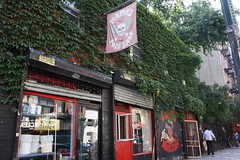The owner of the building that housed Mama’s Food Shop for over 15 years has taken over the space and plans to open a restaurant with “Mama’s” in the name. But don’t call it a comeback.
Richard Freedman, the landlord of 200 East Third Street, was on site today as trash bags were hauled out of the former comfort-food spot.
Mr. Freedman was not an owner of Mama’s Food Shop (that name is still owned by Jeremiah Clancy, who closed the restaurant in July) but he owns Mama’s Bar next-door. He said he had taken over the Food Shop space and planned to install new bathrooms, upgrade the kitchen, and reopen it in the next few months as a restaurant serving comfort food, with the name “Mama’s something or other” (the working title is Mama’s Eats).
“We’re going to mix the menu up a little bit,” said Mr. Freedman, “but we’re still going to have some of the same things – fried chicken, meatloaf with mashed potatoes.” Unlike at Mama’s Food Shop, however, there will be table service as well as dishes like shrimp and grits, which nod to Mr. Freedman’s time as a South Carolina resident (the onetime East Villager now lives on 34th Street).
“Our goal is to keep it cheap and keep it friendly,” he said.
Mr. Freedman said he also planned to serve brunch as well as “smashmouth” food, meaning weekend specials with a “high carb, low chew factor” (think fried cheese balls and mashed potatoes and gravy). Leyla Dog, a manager at Mama’s Bar, said the kitchen would be open until 3 a.m. or 4 a.m.
Mama’s Food Shop was originally opened by Michael Rosenfeld, who moved to Italy and turned the restaurant over to Mr. Clancy in 2007. In July, Mr. Clancy sent a letter to supporters and to The Local indicating that the restaurant had closed “due to increasing rents and property taxes, and the constant expenses that arise when maintaining an older building.”
Mr. Freedman said he shared Mr. Clancy’s concerns about the burden of property taxes. “The last few years the city is having to catch up from the shortfall from Wall Street,” he said, “and they’re doing it on the backs of small landlords and small businesses and it’s forcing people into dire straights.”




